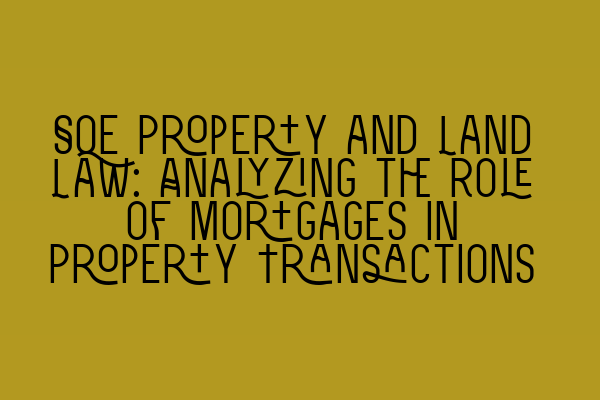SQE Property and Land Law: Analyzing the Role of Mortgages in Property Transactions
Welcome to SQE Property Law & Land Law, where our team of expert solicitors is dedicated to providing you with comprehensive legal services in property matters. In today’s blog post, we will be analyzing the crucial role of mortgages in property transactions.
Before we dive into the details, if you’re preparing for the SQE 1 exams, make sure to check out our SQE 1 Practice Exam Questions and SQE 1 Practice Mocks FLK1 FLK2 to enhance your preparation. For those looking for preparatory courses, our SQE 2 Preparation Courses and SQE 1 Preparation Courses are designed to help you succeed.
Understanding Mortgages in Property Transactions
Mortgages play a crucial role in property transactions by providing individuals with the means to finance their property purchases. A mortgage is a legally binding agreement between a borrower and a lender, typically a bank or a financial institution, where the lender provides a loan to the borrower to purchase a property.
When a borrower takes out a mortgage, the property itself acts as security for the loan. This means that if the borrower fails to repay the loan according to the agreed terms, the lender has the right to repossess the property and sell it to recover the outstanding debt. The legal process of selling a property to recover a debt is known as foreclosure.
The Two Types of Mortgages
In property law, there are two main types of mortgages: a fixed-rate mortgage and an adjustable-rate mortgage.
1. Fixed-Rate Mortgage:
A fixed-rate mortgage is a type of mortgage where the interest rate remains constant throughout the loan term. This means that the borrower’s monthly mortgage payments remain the same, providing stability and predictability. Fixed-rate mortgages are popular among homeowners who prefer a consistent repayment structure.
2. Adjustable-Rate Mortgage:
An adjustable-rate mortgage (ARM) is a type of mortgage where the interest rate fluctuates based on market conditions. The interest rate is typically fixed for an initial period, after which it adjusts periodically according to a predetermined index. This type of mortgage can be beneficial for borrowers who believe that interest rates will decrease in the future.
The Role of Mortgages in Property Transactions
Mortgages not only enable individuals to become homeowners but also play a significant role in property transactions. Here are a few key aspects to consider:
1. Financing Property Purchases:
Most individuals do not have the means to purchase a property outright. Mortgages provide an essential avenue for financing property purchases by spreading the cost over an extended period. This allows individuals to make regular payments towards the loan, making property ownership more attainable.
2. Security for Lenders:
Lenders are exposed to risks when providing loans to borrowers. Mortgages provide lenders with a level of security by using the property as collateral. If the borrower defaults on the loan, the lender can exercise their right to sell the property to recover the outstanding debt.
3. Property Valuation and Surveys:
Before granting a mortgage, lenders require a property valuation and survey to assess the property’s worth and condition. These assessments help lenders determine the loan amount, interest rates, and terms. Property valuations and surveys are essential steps in the mortgage approval process.
4. Legal Documentation and Process:
Mortgages involve intricate legal documentation and processes that must be followed to ensure a smooth transaction. A solicitor plays a crucial role in drafting and reviewing mortgage contracts, conducting property searches, and liaising with lenders and other parties involved in the transaction.
If you’re looking for expert solicitors to guide you through the legal aspects of mortgage transactions, SQE Property Law & Land Law is here to help. Our dedicated team has extensive experience in property law and can ensure that your mortgage transaction is handled professionally and efficiently.
Conclusion
Mortgages are an integral part of property transactions, enabling individuals to finance their property purchases. Whether you’re considering a fixed-rate mortgage or an adjustable-rate mortgage, understanding the role of mortgages is crucial in making informed decisions.
For more information on SQE exams and preparation, be sure to check out our SRA SQE Exam Dates page. Remember, preparation is key to passing the exams and embarking on a successful legal career.
Feel free to contact SQE Property Law & Land Law for expert advice and assistance in property law matters. Our team is always ready to provide you with the guidance you need.
